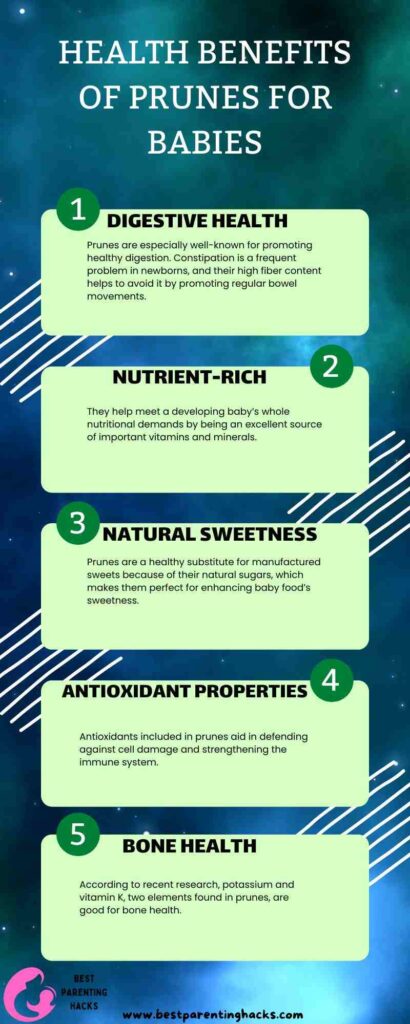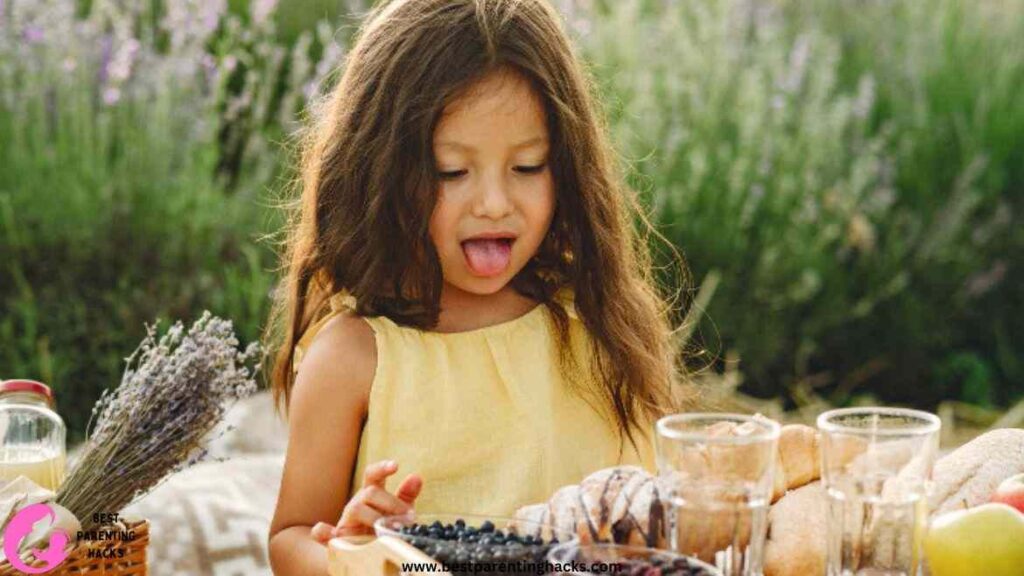Table of Contents
Parents must feed their children appropriate meals if they want them to grow well. This calls for informed decisions about what children should eat, especially in their initial years. A popular home fruit that is frequently mentioned in conversations regarding infant meals is pruned. Prunes are a nutritious and pleasant addition to a baby’s diet because of their high nutrient content. However, one common query from parents is: Is it safe for infants to consume prunes daily?
It’s crucial, in my opinion, to comprehend the place of prunes in a baby’s diet. Prunes are not simply a delicious treat; they are a great source of nutrients essential to a developing baby’s growth. Like any food, though, they ought to be introduced carefully and sparingly. To immediately respond to the query in the title: Newborns can indeed consume prunes every day, but it’s important to consider the baby’s total diet and health as well as the quantity. Prunes have numerous health benefits but due to their high fiber level, it is recommended that they be consumed moderately so as not to cause stomach problems.

Health Benefits of Prunes for Babies
Prunes are a nutritional powerhouse that has several advantages for a baby’s health beyond merely being a delicious snack.
1. Digestive Health: Prunes are especially well-known for promoting healthy digestion. Constipation is a frequent problem in newborns, and their high fiber content helps to avoid it by promoting regular bowel movements.
2. Nutrient-Rich: They help meet a developing baby’s whole nutritional demands by being an excellent source of important vitamins and minerals.
3. Natural Sweetness: Prunes are a healthy substitute for manufactured sweets because of their natural sugars, which makes them perfect for enhancing baby food’s sweetness.
4. Antioxidant Properties: Antioxidants included in prunes aid in defending against cell damage and strengthening the immune system.
5. Bone Health: According to recent research, potassium and vitamin K, two elements found in prunes, are good for bone health.
If prunes are given to a baby’s diet in the appropriate way and at the proper times, it can greatly benefit their growth and well-being.
You Might Also Like to Read: Why Does a Baby Open and Close Hands When Excited?
What Are Prunes?
Prunes have a deep hue and a sweet, rich flavor and are dried plums. Not only are they delicious, but they are also a healthy staple in many households. Prunes are a nutrient-dense dietary option because they go through a drying process that concentrates their nutrients.
1. Nutritional Profile: Potassium, vitamin K, iron, and other vitamins and minerals are abundant in prunes. They also contain dietary fibres which are an added advantage.
2. Texture and Taste: Prunes have a chewy texture and a sweet, caramel-like flavor that appeals to both adults and kids because of the drying process.
3. Versatility in Cooking: Prunes are a versatile ingredient that may be added to savory meals or utilized as a natural sweetener in infant food.
4. Shelf Life: Prunes are a handy pantry staple because of their longer shelf life than fresh fruits because of their dry state.
In general, prunes serve as the best option for inclusion in an infant’s feed due to their combination of taste, nutrients, and ease of use.
You Might Also Like to Read: Can You Put Gel in Baby Hair?

When Can Babies Start Eating Prunes?
A baby’s diet should be carefully introduced to prunes. Although starting around six months of age is generally advised, this might change according to the baby’s health and developmental stage.
1. Age of Introduction: A baby may generally be introduced to prunes around the time they begin eating solid meals, which is approximately six months.
2. Starting with Puree: Presenting prunes as puree is a secure approach to introducing this novel dish at first.
3. Observing Reactions: When introducing prunes, it’s critical to keep an eye out for any allergic responses or digestive problems.
4. Gradual Increase: As the infant becomes used to prunes, start with modest amounts and progressively increase the quantity.
5. Combining with Other Foods: Prunes may be added to other foods as the baby gets older to provide wholesome, well-balanced meals.
When introduced to your kid at the appropriate time and in the appropriate manner, prunes can provide all the nutritional advantages without causing any negative side effects.
Daily Consumption of Prunes: Is It Safe?
Prunes are healthy, but it’s crucial to think about how much a baby’s diet should contain each day.
1. Moderation is Key: To avoid digestive problems, prunes should be consumed in moderation due to their high fiber content.
2. Balanced Diet: A varied diet comprising a range of foods should include prunes.
3. Quantity Matters: It’s usually okay to have a modest portion of prune puree or a few pieces of rehydrated prune every day.
4. Individual Tolerance: Since every infant is unique, it’s critical to modify the amount by dietary requirements and tolerance.
If you include prunes in your baby’s diet carefully and sparingly, it may be both safe and healthy.

Creative Ways to Include Prunes in Your Baby’s Diet
There are several inventive methods to incorporate prunes into a baby’s diet.
1. Prunes Puree: Adding prune puree to yogurt or oatmeal is a quick and easy method to incorporate prunes.
2. Mixed with Cereals: To give sweetness and nutrients to infant cereals, mix prune puree with them.
3. Prune and Apple Sauce: A tasty and healthful snack is made by combining prune puree with apple sauce.
4. Baked Goods: You may add prunes to baked goods like pancakes or muffins for older babies.
5. As a Natural Sweetener: In recipes for homemade baby food, prune puree can be used as a natural sweetener.
These techniques guarantee that your infant will benefit from prunes’ flavor and health properties in several ways.
Understanding the Risks: Allergies and Choking Hazards
Prunes are typically safe, but there are some possible concerns to be aware of, such as choking hazards and allergies.
1. Allergy Awareness: While rare, allergic reactions to prunes can occur in certain newborns. It’s crucial to introduce them gradually and keep an eye out for any indications of an adverse response.
2. Choking Hazards: Whole prunes present a choking hazard to infants because of their size and texture. Make sure prunes are always presented in a way that is safe for infants to eat.
3. Digestive Discomfort: Due to the high fiber content of prunes, newborns may occasionally have diarrhea or digestive distress.
4. Balancing with Other Foods: A baby’s diet should balance prunes with other foods to prevent any unfavorable consequences.
Prunes can be a safe and healthful supplement to your baby’s diet if you are aware of these hazards and take appropriate precautions to mitigate them.

Comparing Prunes with Other Fruits
Prunes are different from other fruits in that they have special nutritional advantages.
1. Higher Fiber Content: Compared to many other fruits, prunes have a greater fiber content, which makes them especially beneficial for digestive health.
2. Rich in Vitamins and Minerals: They are a great source of vitamins and minerals that are necessary for a baby’s growth and development, including potassium and vitamin K.
3. Natural Sweetness: Prunes are a better option for infant food that has added sugars because of their inherent sweetness.
4. Antioxidant Properties: Prunes are rich in antioxidants, which are good for immunity and general health.
Prunes have certain advantages over other fruits, which makes them a desirable addition to a baby’s diet.
Expert Opinions and Parental Tips
Prunes have several health advantages and are frequently recommended by pediatricians and nutritionists, particularly for newborns who are constipated. Prunes are an excellent addition to a baby’s diet, as many parents have reported.
1. Pediatrician Recommendations: Prunes are frequently recommended by medical professionals as a home cure for constipation in infants.
2. Parental Experiences: To ensure their baby’s diet is both nutritious and varied, parents have come up with inventive methods to incorporate prunes.
3. Nutritionist Advice: Prunes are a good choice for digestion due to their high nutritional content and advice from nutritionists.
4. Balancing with Other Foods: Experts suggest balancing prunes with other fruits and meals to guarantee a well-rounded diet.
5. Observing Baby’s Response: It’s critical to monitor your baby’s reaction to prunes and modify their diet as necessary.
Expert views and firsthand accounts from parents highlight the advantages and significance of introducing prunes into a baby’s diet.

Conclusion
To sum up, prunes can be a nutritious and advantageous addition to a baby’s diet. Nutritious prunes are excellent dietetic options since they can facilitate digestion and provide essential vitamins and minerals. Prunes should be introduced carefully and moderately, nevertheless, considering the baby’s general diet and health. As with any new meal, it’s important to watch the baby’s reaction and modify the amount and timing of prunes. Since the parents’ baby is not left behind in terms of the health benefits that come with its consumption, it becomes a useful fruit to include in a diet.
FAQs
1. How much prune puree should I feed my infant each day?
• Depending on your baby’s tolerance, start with a modest quantity, like a teaspoon, and work your way up to a tablespoon.
2. Can infants get allergies from prunes?
• Occasionally, allergies may arise from prunes. As you carefully introduce them, keep an eye out for any allergic responses.
3. Do prunes help people who are constipated more than other fruits?
• Because prunes contain sorbitol, a natural laxative, and have a high fiber level, they are very helpful for constipation.
4. How can I give my infant prunes?
• Start with a tiny bit of prune puree and see how your baby responds. As they become accustomed to it, they gradually increase the quantity.
5. Can I feed prunes to my infant every day?
• Prunes can be consumed in moderation each day, but keep an eye out for any indications of gastrointestinal distress.
6. What symptoms may a baby have of eating too many prunes?
• Unusual feces, diarrhea, or pain in the abdomen are warning signs.
7. Are there any hazards involved in giving prunes to infants?
• Potential allergies, choking dangers, and stomach problems in the event of overconsumption are among the risks. Prunes should always be served in moderation and a safe manner.




